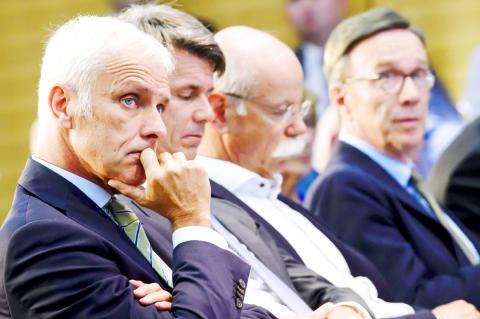Switzerland is to demand that German automakers treat Swiss customers the same as German buyers of diesel cars being fixed to cut pollution, Swiss Federal Roads Office Director Juerg Roethlisberger said.
The comments by add pressure on carmakers like Volkswagen AG, BMW AG, Daimler AG, Audi and Porsche, which this week agreed to overhaul engine software on 5.3 million diesel cars and try to repair the sector’s battered reputation.
Politicians in Germany stopped short of demanding costly mechanical modifications to engine and exhaust systems.

Photo: EPA
“I can guarantee you that we will certainly demand the same for Swiss customers that German customers get,” Roethlisberger told broadcaster SRF in an interview aired on Saturday.
Swiss authorities would monitor the situation to see what the proposed fixes bring and if public pressure forces German carmakers to take the more costly step of replacing hardware on affected cars, then Switzerland would demand the same, he said.
NO BAN
Roethlisberger dismissed calls from Swiss environmentalists and center-left politicians to ban the import of certain diesel vehicles on the grounds that their nitrogen oxide emissions posed a health hazard.
Swiss prosecutors last year opened criminal proceedings and seized evidence from the AMAG dealership network after a court ruled Swiss investigators must conduct their own investigation of an emissions scandal at Volkswagen.
AUDI IMPLICATED
Meanwhile, Bavaria state prosecutors in Munich made Audi a party to the diesel-emission probe, a step that might allow the seizure of profits the company made from selling vehicles with rigged engines.
Munich prosecutors investigating Audi employees for fraud have formally added the carmaker to a related inquiry looking into whether executives neglected their supervisory duties allowing the cheating to happen, Karin Jung, spokeswoman for the investigators, said in an e-mailed statement.
The review will be handled under administrative rules that allow for sanctioning wrongdoing at companies.
While Germany does not allow for prosecution of companies under criminal laws, an administrative probe is the tool prosecutors can use to sanction firms.
The rules allow authorities to seize profits made through illegal conduct.
Siemens AG, which faced the same type of review during a corruption probe about a decade ago, settled with Munich prosecutors for 600 million euros (US$706 million).
Audi was notified about the step and will continue to work constructively with prosecutors, company spokesman Oliver Scharfenberg said on Saturday.
Volkswagen is already facing the same type of review by Braunschweig prosecutors.
The company in September 2015 admitted that about 11 million diesel vehicles worldwide were sold with so-called defeat devices.
Additional reporting by Bloomberg

KEEPING UP: The acquisition of a cleanroom in Taiwan would enable Micron to increase production in a market where demand continues to outpace supply, a Micron official said Micron Technology Inc has signed a letter of intent to buy a fabrication site in Taiwan from Powerchip Semiconductor Manufacturing Corp (力積電) for US$1.8 billion to expand its production of memory chips. Micron would take control of the P5 site in Miaoli County’s Tongluo Township (銅鑼) and plans to ramp up DRAM production in phases after the transaction closes in the second quarter, the company said in a statement on Saturday. The acquisition includes an existing 12 inch fab cleanroom of 27,871m2 and would further position Micron to address growing global demand for memory solutions, the company said. Micron expects the transaction to

Nvidia Corp’s GB300 platform is expected to account for 70 to 80 percent of global artificial intelligence (AI) server rack shipments this year, while adoption of its next-generation Vera Rubin 200 platform is to gradually gain momentum after the third quarter of the year, TrendForce Corp (集邦科技) said. Servers based on Nvidia’s GB300 chips entered mass production last quarter and they are expected to become the mainstay models for Taiwanese server manufacturers this year, Trendforce analyst Frank Kung (龔明德) said in an interview. This year is expected to be a breakout year for AI servers based on a variety of chips, as

Global semiconductor stocks advanced yesterday, as comments by Nvidia Corp chief executive officer Jensen Huang (黃仁勳) at Davos, Switzerland, helped reinforce investor enthusiasm for artificial intelligence (AI). Samsung Electronics Co gained as much as 5 percent to an all-time high, helping drive South Korea’s benchmark KOSPI above 5,000 for the first time. That came after the Philadelphia Semiconductor Index rose more than 3 percent to a fresh record on Wednesday, with a boost from Nvidia. The gains came amid broad risk-on trade after US President Donald Trump withdrew his threat of tariffs on some European nations over backing for Greenland. Huang further

HSBC Bank Taiwan Ltd (匯豐台灣商銀) and the Taiwan High Prosecutors Office recently signed a memorandum of understanding (MOU) to enhance cooperation on the suspicious transaction analysis mechanism. This landmark agreement makes HSBC the first foreign bank in Taiwan to establish such a partnership with the High Prosecutors Office, underscoring its commitment to active anti-fraud initiatives, financial inclusion, and the “Treating Customers Fairly” principle. Through this deep public-private collaboration, both parties aim to co-create a secure financial ecosystem via early warning detection and precise fraud prevention technologies. At the signing ceremony, HSBC Taiwan CEO and head of banking Adam Chen (陳志堅)